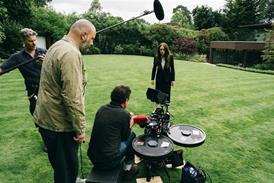There were odd scenes outside many arthouse cinemas in Japan in early May - protestors gathered, yelling into megaphones, urging people not to see a film, while cinema owners requested police protection for their audience.
The cause of the controversy was Yasukuni a documentary by Tokyo-based Chinese film-maker Li Ying, about the contentious Yasukuni Shrine in Tokyo, where the spirits of 2.5 million of Japan's war dead are "enshrined".
The shrine is seen by some Japanese, including the government, as a holy place. But many in Japan's neighbouring countries see it as a symbol of Japanese militarism. More than 1,000 of the enshrined are war criminals, including 14 Class-A war criminals.
Li's film, 10 years in the making, examines the history and debate around the shrine. The Chinese film-maker, who has lived in Japan for 19 years, says he worked hard to make an impartial film.
"By exploring the symbolic world of the shrine, we can then form a perspective to see why Japan has an ambiguous attitude towards the Second World War," Li says.
However, some right-wing groups in Japan consider the film to be anti-Japanese. Originally scheduled for an April release by Japan's Nine Entertainment and Argo Pictures, the release was pushed back as four Tokyo cinemas cancelled the release after receiving security threats from extremists. Li and other film-makers who have supported the release of the film have received death threats.
Co-produced by Li's Dragon Films, Beijing Film Academy's Youth Studio and Beijing Zhongkun Films, the film received a subsidy of $70,000 (Yen7.5m) from the Japan Arts Council. Fierce debate has surrounded that subsidy. In March, several Japanese legislators demanded Japan's Agency of Cultural Affairs screen the film to check the film's objectivity. Legislators and Japanese media began to question Japan's government film funding policy; some even began to call for censorship. However, the Directors Guild of Japan expressed apprehension about the possible infringement of freedom of expression.
Such reactions have done nothing but help the commercial performance of the film, with an increasing number of exhibitors eager to screen the film. Released on May 3, Yasukuni notched up 6,000 admissions in its first week in Tokyo's mini-theatres of under 200 seats, breaking Japan's record for screen averages. It has garnered 42,000 admissions to date.
"The most important thing is that Japanese audiences are now willing to see the film," says Li.
The film screened at the Pusan, Sundance and Berlin film festivals and won the best documentary award at the Hong Kong International Film Festival in April. It is being sold by Hong Kong-based The Film Library, which has sold French rights to Jupiter Communications, in association with Floris Films, where it is scheduled for an August release. Further deals are in the works. It will be released in China after the Beijing Olympics.
Advised by the Japanese police to avoid all the Japanese screenings of the film, Li has had to shift his career back to China. His next film will be a tragi-comedy tentatively titled The Age To Laugh, which according to Li, will be a contemporary story about the Olympic Games.

















No comments yet